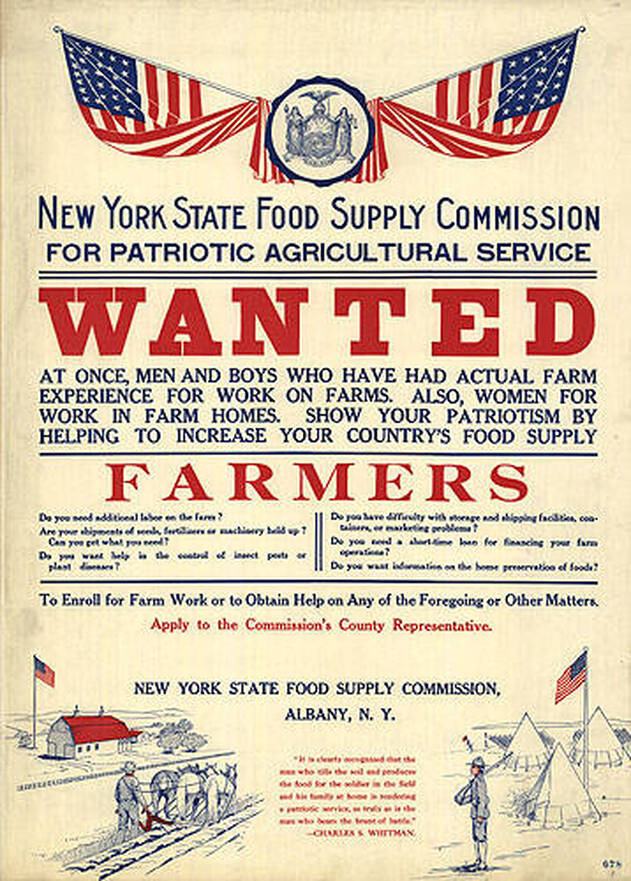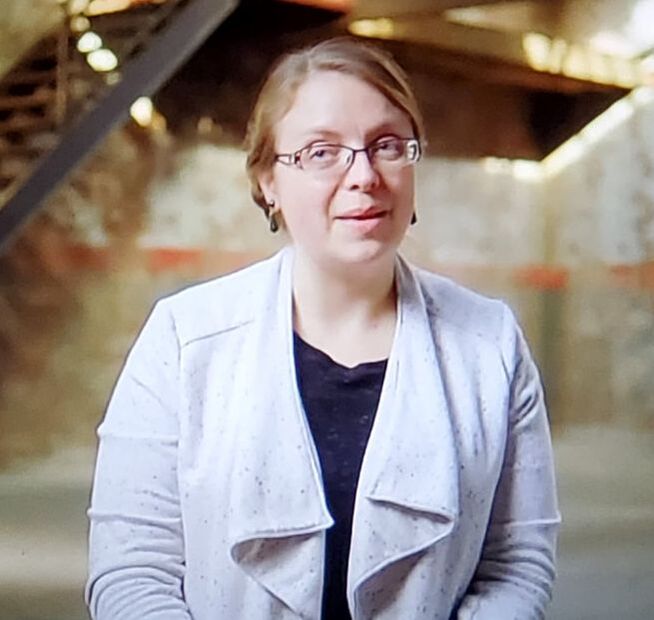 "New York State Food Supply Commission for Patriotic Agricultural Service. Wanted at once, men and boys who have had actual farm experience for work on farms. Also, women for work in farm homes. Show your patriotism by helping increase your country's food supply. Farmers - Do you need additional labor on the farm? Are your shipments of seeds, fertilizers or machinery held up? Can you get what you need? Do you want help in the control of insect pests or plant diseases? Do you have difficulty with storage and shipping facilities, containers, or marketing problems? Do you need a short-term loan for financing your farm operations? Do you want information on the home preservation of foods? To Enroll for Farm Work or to Obtain Help on Any of the Foregoing or Other Matters. Apply to the Commission's County Representative. New York State Food Supply Commission, Albany, N.Y." 1917, Temple University. The United States entered the First World War on April 6, 1917. On April 13, New York State Governor Charles S. Whitman appointed a Patriotic Agricultural Service Committee. On April 17, an Act of the New York State legislature created the New York State Food Supply Commission. This propaganda poster is likely from the spring of 1917 for several reasons. First, by the fall of 1917, the commission had changed its name to the New York State Food Commission, Second, the emphasis on laborers with farming experience, rather than the inexperienced, was a hallmark of early efforts to increase agricultural production. The poster reads: "New York State Food Supply Commission for Patriotic Agricultural Service. Wanted at once, men and boys who have had actual farm experience for work on farms. Also, women for work in farm homes. Show your patriotism by helping increase your country's food supply. Farmers - Do you need additional labor on the farm? Are your shipments of seeds, fertilizers or machinery held up? Can you get what you need? Do you want help in the control of insect pests or plant diseases? Do you have difficulty with storage and shipping facilities, containers, or marketing problems? Do you need a short-term loan for financing your farm operations? Do you want information on the home preservation of foods? To Enroll for Farm Work or to Obtain Help on Any of the Foregoing or Other Matters. Apply to the Commission's County Representative. New York State Food Supply Commission, Albany, N.Y." Interestingly, this poster not only focuses on farm labor, seed acquisition, farm loans, etc., but also on securing women's labor "for work in farm homes." The general idea was that women could help relieve some of the household burden on farm wives, and assist with food preservation, so that farm wives, who were often more experienced in farm management than most farm laborers, could assist their husbands. Neither plan really worked out well. The few women who were interested in farm labor wanted to do the agricultural work - not housework. And while experienced farm hands were in high demand, that drove wages up considerably - not every farmer was able to afford them. The Food Supply Commission coped by helping some farms modernize. They purchased a series of tractors - then still a rarity in the Northeast - and helped farmers acquire seed potatoes, beans, and more. But it took until the end of 1917 for the Commission to find its footing. By then, it became a partner of the United States Food Administration, working hand-in-hand with Hoover. You can read more about the New York State Food Supply Commission and its early work in its annual report for 1917, published in 1918. The Food Historian blog is supported by patrons on Patreon! Patrons help keep blog posts like this one free and available to the public. Join us for awesome members-only content like free digitized cookbooks from my personal collection, e-newsletter, and even snail mail from time to time!
0 Comments
|
AuthorSarah Wassberg Johnson has an MA in Public History from the University at Albany and studies early 20th century food history. Archives
July 2024
Categories
All
|

 RSS Feed
RSS Feed